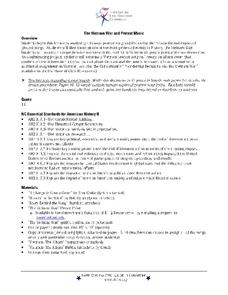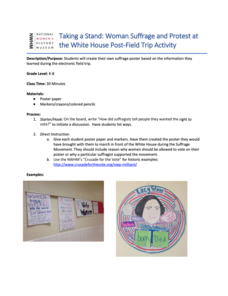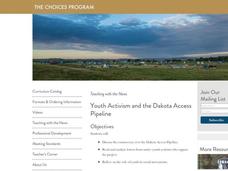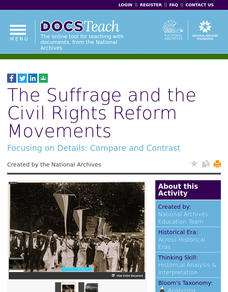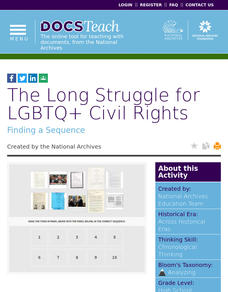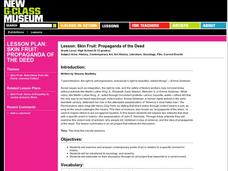National Endowment for the Humanities
Martin Luther King, Jr. and Nonviolent Resistance
Was nonviolent resistance the best means of securing civil rights for black Americans in the 1960s? In this highly engaging and informative lesson, your young historians will closely analyze several key documents from the civil rights...
Curated OER
Lesson: Unmonumental: War, Politics, and Protest
Get those upper graders thinking about the world, social conflict, and art as a catalyst for change. They'll uncover the meanings behind four abstract works, intended to spread awareness of the need for social change. Kids are then asked...
Carolina K-12
The Vietnam War and Protest Music
Here's a must-have resource for your Vietnam War curriculum file. Class members view a PowerPoint that details the background of the conflict and then examines the reasons for and the effects of protest songs on American attitudes toward...
Curated OER
The Art of Protesting
Young scholars view various images to examine different types of protest Americans have used throughout history, and explore ways in which protest can produce change for better or worse.
Curated OER
Concept Formation Lesson Plan: Understanding "Protest"
After analyzing both examples and non-examples of a variety of protests conducted by ethnic groups in Seattle and the state of Washington during the twentieth century, your class members will work to identify the key ideas and components...
National Endowment for the Humanities
Revolution '67, Lesson 1: Protest: Why and How
To some people, protesting is as American as apple pie, but the factors that lead to protests can be as confusing to veteran activists as to today's youth. Revolution '67 explores the riots in Newark, New Jersey as a case study. Using...
Curated OER
The Movement Before the Movement: Civil Rights Activism in the 1940s
Many educators focus on the civil rights movement as it occurred after Rosa Parks incited the bus boycott. Extend the understanding of the fight for civil rights in the United States with this post-WWII lesson. Learners examine and...
Simon & Schuster
Classroom Activities for Walden and Civil Disobedience by Henry David Thoreau
An 11-page packet contains three activities designed for readers of Henry David Thoreau's Walden and Civil Disobedience. In one exercise, groups debate whether Thoreau would today be considered liberal or conservative. For another,...
National Woman's History Museum
Taking a Stand: Woman Suffrage and Protest at the White House K-8
A class discussion opens a lesson on women suffragettes. Learners imagine they are preparing to protest for women's voting rights. Scholars create a colorful poster to hold up high when marching in front of the White House.
Curated OER
Protests against Bush
Non-violent conflict resolution is the focus of this lesson, which addresses the protests against President Bush in the UK (2003). Pupils list the strengths and limitations of non-violent conflict resolution, and chart the cycles of...
Curated OER
"Uncle Sam's Got Himself in a Terrible Jam": Protest Music and the Vietnam War
"And it's one, two, three...what are we fighting for?" Use music to assess the climate of protest during the Vietnam War, listening to and analyzing Country Joe MacDonald's "I-Feel-Like-I'm-Fixin'-To-Die Rag" (lyrics included)....
Curated OER
America Established Because of Protest
Students explore events and causes that led to American Revolution and examine popular pro-Patriot renderings and texts of these issues created both at that time and in later years. Students then prepare and deliver oral presentations...
Brown University
Youth Activism and the Dakota Access Pipeline
Do young people have a role in social movements? Should they? The involvement of young people in the Dakota Access Pipeline is the focus of a resource that asks class members to examine letters written by native youths who oppose the...
Curated OER
Thou Dost Protest
Students analyze recent anti-American protests around the world, using Pakistan as a starting point. They read and discuss, In Streets of Pakistani Cities, Cries of 'Death to America! students develop and present case studies of protests.
Curated OER
Lesson One: Protest And Persuasion
Students look for visual signs of protest and persuasion in the world around them. They develop inquiry questions to guide their investigation and identify ideas for their own art making focused on protest or persuasion.
Curated OER
Cartoons and Protest
Students examine political cartoons from 1774 through today, determine their meanings through analysis and discussion, and create their own political cartoons focusing on historical issues studied in class.
DocsTeach
The Suffrage and the Civil Rights Reform Movements
It's the American way to put one foot in front of the other and march. Using images of protests from the civil rights and women's suffrage movements, young historians analyze similarities between the two watershed moments of social...
DocsTeach
Martin Luther King, Jr. and the Fight for Civil Rights
Find clues to the past with photos! Young historians use a photo from one of Martin Luther King Jr.'s peaceful protests to practice photo analysis. Academics look at the image to gain clues about what is happening and why. To finish,...
Mississippi Department of Archives and History
Protesting Violence without Violence
The ultimate legacy of Emmett Till's violent death is its role in the non-violent roots of the Civil Rights Movement. A lesson compares contemporaneous articles with the lyrics of Bob Dylan's "The Death of Emmett Till" and prompts...
National Constitution Center
Born in the U.S.A: Music as Political Protest
Though often used in shows of patriotism, Bruce Springsteen's 1985 song "Born in the U.S.A." is critical of America's role in the Vietnam war and its treatment of American veterans. High schoolers analyze the song's lyrics in an activity...
DocsTeach
The Long Struggle for LGBTQ+ Civil Rights
Academics analyze 10 primary documents and photos to create a timeline of the LQBTQ+ movement. The activity includes an online worksheet. Scholars also participate in a group discussion to understand the long struggle the LGBTQ+...
Curated OER
Lesson: Skin Fruit: Propaganda of the Deed
Art can express acts of injustice and move society to action. Upper graders analyze contemporary art relating to specific moments in history. They discuss propaganda, anarchy, sociology, and violence as activism. After researching and...
Simon & Schuster
Classroom Activities for The Jungle by Upton Sinclair
A 15-page packet includes detailed plans for three activities related to Upton Sinclair's The Jungle. To gather background information, class members research topics and create a newspaper page reporting their findings. After finishing...
Curated OER
Protest Music of the 60's
Students demonstrate their knowlege about protest music of the late sixties by creating miniature protest signs.




